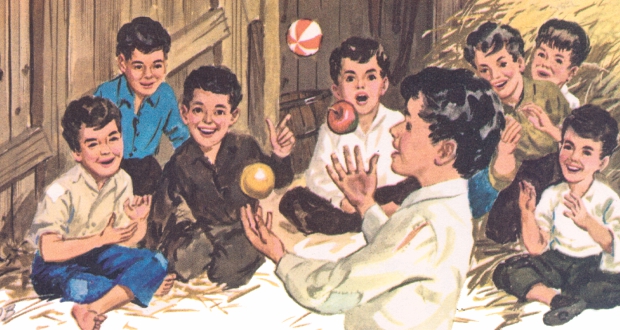Dr. Mitchell Kalpakgian
February 18, 2014
9,536 Views
by Mitchell Kalpakgian | Listening to the talk shows on television every night, watching athletic events all day Saturday and Sunday, and spending hours on the Internet do not organize the day, deserve priority, or require the discipline of will power. They do not breathe life, nourish the mind, or lift the soul. A person does not need more time to do these essential things but a greater desire to do first things first.
Read More »
Dr. Mitchell Kalpakgian
February 13, 2014
8,990 Views
by Mitchell Kalpakgian | The whole episode made no sense to him, and he was at a loss for some possible explanation for his great frustration. The only comfort his mind offers is the knowledge that the accident was not a great tragedy. He acknowledges with gratitude the escape from other “torments and evils to which even this wasted wine would have seemed a wretched jest.”
Read More »
Dr. Mitchell Kalpakgian
February 6, 2014
8,440 Views
So often in human life we wonder if someone is going to call, coming to visit, or going to write us a letter. We assume that we are to expect, ...
Read More »
Dr. Mitchell Kalpakgian
January 30, 2014
8,242 Views
How easy it is to neglect these amenities of manners that consist of attention to seemingly minor things of no consequence: a thank you note, a compliment, a visit. How convenient it is to use the excuse of busyness with important affairs to avoid attention to small details.
Read More »
Dr. Mitchell Kalpakgian
January 16, 2014
7,545 Views
Contemplation is a form of looking inspired by wonder that moves a person to continue looking at a great work of art or to remain thinking about a great idea, divine miracle, or mystery.There is so much to see or know that one lingers to see more and to think more deeply.
Read More »
Dr. Mitchell Kalpakgian
January 9, 2014
7,084 Views
This great design of awaiting the next pleasure forms the master plan of life designed by a wise Creator who orients man toward the future with hope. No one ever truly wants to return to the past or dreams of recovering the fountain of youth.
Read More »
Dr. Mitchell Kalpakgian
January 2, 2014
8,827 Views
Words, like music, can create harmony or discord. Words, like certain fine instruments, can refine and beautify or, like blunt tools, can break and smash. The art of living requires sensitivity to the choice of words, to the tone of voice, and to the manner of speech.
Read More »
Dr. Mitchell Kalpakgian
December 26, 2013
6,486 Views
Of course civility dictates that a person strive to make a good appearance that befits the occasion in an honest expression of who he or she is, and the person in the role of judge must take into consideration the fact that a first impression may be insufficient grounds for a correct interpretation.
Read More »
Dr. Mitchell Kalpakgian
December 19, 2013
8,309 Views
It is possible to take many things too seriously. Coaches and athletes can take winning too seriously (It’s only a game). The avaricious and the miserly who worship gold take money too seriously (It’s only metal or paper). Politicians can take elections and political power too seriously (They are not the salvation of the world). Scholars can take learning too seriously and presume that man is god and that human knowledge supersedes divine wisdom (“Even though a wise man claims to know, he cannot find it out,” Solomon states in Ecclesiastes).
Read More »
Dr. Mitchell Kalpakgian
December 12, 2013
11,547 Views
Members of a family know each other too well to be fooled by brother’s daydream to be a millionaire, sister’s fantasy to be a great actress, or grandson’s ambition to be a professional athlete. The family teaches humility, self-knowledge, the art of the possible, and the way things are.
Read More »
Dr. Mitchell Kalpakgian
December 5, 2013
8,601 Views
In Robert Frost’s famous poem “The Road Not Taken,” a traveler recalls a moment in his life when he reached a crossroads. He comes to a turning point on the journey and pauses to consider which path to follow. Both roads have fair prospects and great allure.
Read More »
Dr. Mitchell Kalpakgian
November 28, 2013
6,941 Views
In Kenneth Graham’s The Wind in the Willows Mr. Toad, the owner of Toad Mansion and the great traveler on the Open Road who is always on a new vehicle going to faraway places, cannot comprehend how Mr. Rat can find contentment in a simple cottage on the river where he dwells all year and never explores the wider world of new sights and foreign lands: “You surely don’t mean to stick to your dull fusty river all your life, and just live in a hole in a bank, and boat. I want to show you the world.”
Read More »
Dr. Mitchell Kalpakgian
November 21, 2013
12,445 Views
While it is a most human to desire the ideal, seek the best, and have the highest goals, all human lives suffer damages and require rebuilding. The unfaithful husband or wife, the deaths and illnesses in a family, the rebellion of the prodigal son or daughter, the loss of income or work all inflict destruction of some kind that forces another beginning, a fresh approach, a new idea, or the exercise of a heroic virtue.
Read More »
Dr. Mitchell Kalpakgian
November 7, 2013
8,807 Views
While everyone has heard of King Midas’s avarice and his desire for The Golden Touch that transforms everything he touches into gold, not everyone has heard of The Leaden Touch. In Hawthorne’s A Wonder Book one of the children who hears of the famous story about King Midas, remarks, “But some people have what we may call ‘The Leaden Touch,’ and make everything dull and heavy that they lay their fingers upon.”
Read More »
Dr. Mitchell Kalpakgian
October 31, 2013
9,178 Views
Every human being experiences the conflict between duty and pleasure, what a person wishes to do for enjoyment and what a person ought to do by way of obligation. These two tendencies often appear as contrary, irreconcilable powers that inevitably clash and produce resentment or frustration.
Read More »
Dr. Mitchell Kalpakgian
October 24, 2013
23,017 Views
Two great ancient philosophers, Marcus Aurelius in Meditations and Boethius in The Consolation of Philosophy — two works renowned for their great wisdom and moral power — teach the importance of the virtue of self-possession. Both writers observe that no persons can control the outside events that surround them.
Read More »
Dr. Mitchell Kalpakgian
October 17, 2013
7,152 Views
Disappointment, rejection, and defeat, however, do not mean incompetence, weakness, or failure. When a person shakes off the dust, he leaves because of the stiff-necked and hardhearted unwillingness of the many that lack docility and openness to the truth the messenger brings.
Read More »
Dr. Mitchell Kalpakgian
October 10, 2013
7,363 Views
In the folk tale, five brothers all choose their profession and perform their work with success and prosperity: a brick maker, a mason, an architect, an innovator, and a critic. However, only the oldest brother unites vocation and avocation, and only his work has effects for the future and for heaven.
Read More »
Dr. Mitchell Kalpakgian
October 3, 2013
13,570 Views
In the story the merchant’s son who wasted his money finds himself in desperate circumstances until a friend gives him a magical flying trunk. When he flies with it and descends from the sky, he introduces himself as a Turkish god who has come from above to marry the king’s daughter. Honored with this privilege, the king gladly agrees to the marriage: “Yes, you shall certainly marry our daughter.”
Read More »
Dr. Mitchell Kalpakgian
September 26, 2013
7,072 Views
To be human is to be born with desires, to have wishes, and to experience longings. But not all wishes have the same quality, nature, or origin. Some wishes assume the shape of daydreams or fantasies as utopian visions enter the mind and people imagine impossibilities.
Read More »


 Seton Magazine Catholic Homeschool Articles, Advice & Resources
Seton Magazine Catholic Homeschool Articles, Advice & Resources


















